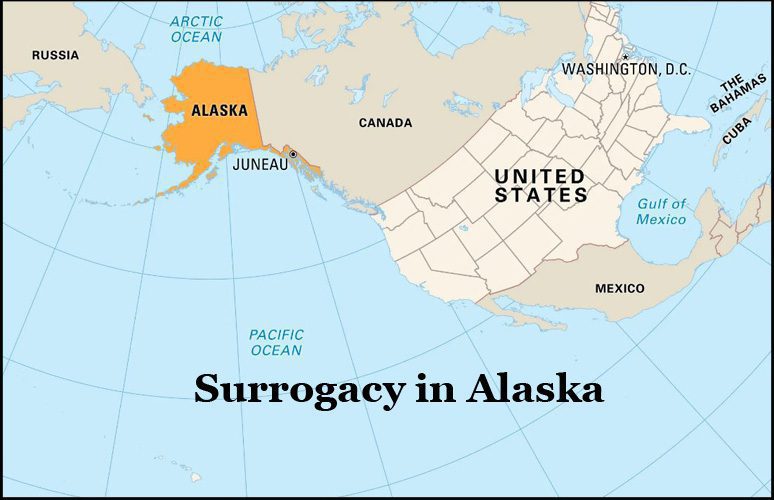Surrogacy in Alaska: A Comprehensive Guide

Surrogacy in Alaska, also known as the Last Frontier, offers a unique terrain for people looking to extend their families. Surrogacy is a feasible choice for many couples and individuals seeking parenthood.
If you are thinking about surrogacy in Alaska, either as an intended parent or as a surrogate, you probably have a lot of questions about the process, the rules, and the costs. Surrogacy is a complicated but gratifying method of starting or expanding a family, and it involves careful planning and supervision from qualified professionals.
This blog post will give you some basic information regarding surrogacy in Alaska, as well as some ideas and resources to get you started. Alaska, like many other states with no surrogacy regulations, is truly a surrogacy-friendly state.
Get in touch for FREE SURROGACY CONSULTING:
Mobile: +91-8800481100 ( WhatsApp, Line, Viber)
Email: neelam@ivfconceptions.com
Key Highlights of Surrogacy in Alaska
- Surrogacy is legal in Alaska. There are no laws or rules in Alaska that ban or regulate surrogacy, which means that both intended parents and surrogates are free to follow this path.
- In Alaska, gestational or traditional surrogacy can be performed. Although both types of surrogacy are permitted in Alaska, gestational surrogacy is more prevalent.
- In Alaska, heterosexual or LGBTQ+ intended parents can use a surrogate. In Alaska, there are no laws or regulations that discriminate against LGBTQ+ intended parents seeking surrogacy.
- Surrogacy in Alaska includes medical and psychological evaluation. Although there are no laws in Alaska that require surrogates and intended parents to be screened, most surrogacy professionals follow the American Society for Reproductive Medicine (ASRM) guidelines.
- Surrogacy in Alaska typically costs between $157,750 and $184,750.
 An Overview Of Surrogacy in Alaska
An Overview Of Surrogacy in Alaska
Women who want to be surrogates and parents who want to expand their families through surrogacy can both achieve their ambitions in Alaska. Surrogacy is allowed in Alaska because there are no statutes or written case law allowing or forbidding it.
In Alaska, intending parents and the surrogate mother are involved in surrogacy. Intended parents are people who want to expand their family through surrogacy. A surrogate mother (also known as a gestational carrier) will bear the baby for the intended parents.
A gestational carrier can provide a great service and be adequately compensated through surrogacy. Intended parents might realize their desire to start or expand their family.
However, because Alaska has no surrogacy legislation, intended parents and prospective surrogates should consult with an expert surrogacy attorney in Alaska from the start of their journey. Only an attorney can provide the legal counsel you require to protect your rights and interests throughout an Alaskan surrogacy.
Alaska is regarded as a surrogacy-friendly state because it has no laws prohibiting or regulating surrogacy. It does not, however, have any laws that explicitly recognize or protect surrogacy arrangements.
Surrogacy in Alaska is thus based on established practices and precedents established by past instances and specialists. The courts in Alaska are typically supportive of surrogacy and approve pre-birth orders that establish the intended parents’ legal parentage before the child is born.
Surrogacy in Alaska can be done on one’s own or with the assistance of a surrogacy agency. Throughout the surrogacy process, an agency is a professional organization that provides guidance, support, and services to both intended parents and surrogates. An agency can assist you in finding the right match, coordinating medical and legal procedures, managing finances and expenses, and providing counselling and education.
Surrogacy laws in Alaska

While surrogacy has been used for decades, you may be wondering if there are any conditions or Alaska surrogacy laws that limit the process. As you prepare for surrogacy, be aware of your legal choices and how they can help you have a pleasant surrogacy experience.
Alaska is a surrogacy-friendly state because there are no laws that restrict it. Surrogacy, specifically compensated surrogacy, is allowed in Alaska because there are no laws against it. There are no additional laws that govern same-sex surrogacy.
There are no regulations that only apply to LGBTQ+ intended parents; thus, the process will be the same as it would be for a heterosexual couple. Any adoption orders required as a result of egg or sperm donors would be the only conceivable exemption.
Legal Surrogacy Contract in Alaska
A surrogacy contract is an essential component of the surrogacy procedure. Even if both parties have a terrific relationship, you will still need to construct a legal contract to ensure everyone’s interests are safeguarded. A legal contract can also help to define pre-birth orders and will be useful if adoption is required after the delivery. Your legal contract will include the following provisions:
- Potential responsibilities and risks
- Consensus on sensitive matters such as selective reduction and termination
- Compensation for surrogates
- Hospitalization strategy
- Compensation for surrogates
- Rights and responsibilities of both parties
Why Do I Need A Surrogacy Attorney in Alsaka?
 When it comes to the legal procedure, some people may be nervous. However, having an attorney will assist you in navigating the procedure. They will assist with the legal contract utilized by the surrogate and intended parents.
When it comes to the legal procedure, some people may be nervous. However, having an attorney will assist you in navigating the procedure. They will assist with the legal contract utilized by the surrogate and intended parents.
A surrogate lawyer in Alaska can assist you with:
- Navigating the Surrogacy Laws in Alaska
- Creating and finalizing the surrogacy agreement
- Assisting in the placement of the intended parent’s names on the baby’s birth certificate
- Ensuring the effectiveness of any pre- or post-birth parentage orders
- Considering critical problems such as parental rights and surrogate compensation
Parentage Orders in Alaska Surrogacy Laws
You’ve probably come across pre-birth and post-birth parentage orders. This is done to help determine who the baby’s parents are, especially if the intended parents are not genetically related. In 1989, the Alaska Supreme Court declared that surrogacy was equivalent to adoption. As a result, a post-birth adoption is required.
In 2014, however, a court issued a pre-birth order to a heterosexual couple who used their own eggs and sperm. The availability of a pre-birth parentage order is frequently dependent on the judge handling the case. Your surrogacy attorney can guide you through the procedure and ensure you receive the proper parentage order.
Is Gestational Surrogacy Legal in Alaska?
Yes. Gestational Surrogacy is legal in Alaska because there are no statutes or written case law that allow or prohibit it. Surrogacy professionals have devised a method for intending parents and surrogates to follow in order to ensure a successful trip.
In Alaska, is traditional surrogacy legal?
Yes. Traditional surrogacy, like gestational surrogacy, is presumed to be legal because there are no laws forbidding it. However, because conventional surrogacy is a more involved process with more legal and emotional concerns, relatively few surrogate attorneys will finish it.
Is same-sex surrogacy permitted in Alaska?
Yes. Same-sex couples and LGBT+ intended parents have the same legal rights as opposite-sex couples and will go through the same surrogacy process, with the exception of potentially needing an egg donor or sperm donor to complete the IVF procedure.
When do the intended parents have to finish an adoption after their child is born?
When only one intended parent has a genetic tie with the child, the court may order the other parent to adopt as a stepparent or second parent (or “co-parent”) after the kid is born. If the intended parents do not live in Alaska, they may have to petition for second-parent adoption in the state where they live.

How Much Does Surrogacy Cost In Alaska?
The road to surrogacy is fraught with mixed feelings. When determining the cost of surrogacy in Alaska with different organizations, you may become confused and concerned. While having the family you’ve always wanted may seem priceless, it’s crucial to understand what you’ll be financially liable for in the process.
We’ve outlined the costs of surrogacy in Alaska as well as what you may anticipate paying during the process.
Surrogacy in Alaska typically costs between $89,750 and $184,750. This range is determined by a variety of factors, including the type of surrogacy chosen, the medical treatments required, the surrogate’s salary and expenses, legal fees, and any unforeseen costs.
Main expenses that make the total cost of surrogacy in Alaska
| EXPENSES | COST |
| Agency fees: This is the price paid to a surrogacy agency, to assist you in finding a suitable surrogate mother. Agency costs might vary depending on the agency’s quality of service and experience. | They normally range between $25,000 and $45,000 |
| Surrogate compensation: This is the fee you pay your surrogate mother in exchange for her time, work, and sacrifice in bearing your child. Surrogate pay varies according to the surrogate’s experience, location, preferences, and agreement with you. | It normally ranges from:$35,000 to $65,000 |
| Medical Expenses: These are the fees levied by the fertility clinic that performs the IVF treatment and oversees the pregnancy of your surrogate. The cost of medical care varies depending on the clinic’s reputation, location, and success rate. They may also be affected by the number of required cycles, transfers, and tests. | Medical bills might cost anywhere from $30,000 to $80,000 or more. |
| Egg Donation Fee: The fee you pay to an egg donor if you need to use donor eggs for surrogacy. The charge for egg donation varies depending on the egg donor’s experience, location, preferences, and agreement with you. Additional costs for milestones such as screening tests, medicine injections, egg retrieval, and so on may be included in the egg donation charge | which usually ranges from $10,000 to $20,000 |
| Legal Fees: Legal fees are the fees charged by the attorneys who represent you and your surrogate (and, if applicable, the egg donor) in preparing and revising the surrogacy contract and establishing parentage. Legal fees vary depending on the complexity of your case and the regulations of your state | Legal fees might run anywhere from $10,000 to $30,000. |
Surrogacy costs in Alaska may also vary depending on other considerations, such as:
- The number of IVF rounds and embryo transfers required to successfully achieve pregnancy
- The number of embryos transplanted and the birth rate
- The type of surrogacy (gestational or traditional), as well as the egg donor (known or anonymous).
- The surrogate’s and intended parents’ insurance coverage
- Any unanticipated events or problems
Ways to offset the Surrogacy Cost in Alaska
- Choosing a Low-Cost Agency
- Deciding on a local surrogate
- Choosing a nearby egg donor
- Choosing a low-cost fertility clinic
- Looking for Insurance
- Seeking employer perks
- Applying for grants or loans
Related surrogacy Costs guides:
What is the average surrogacy cost?
How much does surrogacy cost in Ukraine?
How much does surrogacy cost in Georgia?
How much does surrogacy cost in India?
What is the Surrogacy Cost in Colombia?
What is Surrogacy cost in Mexico?
What is surrogacy cost with family members?
Surrogacy In Alaska for Intended Parents
 Surrogacy in Alaska is an option for intended parents who desire to start a family this way. However, because Alaska has no surrogacy regulations, it is essential to consult with an experienced surrogacy expert and an attorney to ensure a safe and legal process.
Surrogacy in Alaska is an option for intended parents who desire to start a family this way. However, because Alaska has no surrogacy regulations, it is essential to consult with an experienced surrogacy expert and an attorney to ensure a safe and legal process.
The decision to use surrogacy in Alaska to expand your family is an exciting one for intended parents.
For many intended parents, the first question is whether surrogacy is legal in Alaska. Yes, but there are no explicit surrogacy regulations in Alaska that govern the process.
This means that rather than rules or regulations, surrogacy in Alaska is governed by case law and professional standards.
The absence of surrogacy regulations in Alaska does not imply that surrogacy in this state is hazardous or unregulated. Alaska, on the other hand, has a well-established surrogacy protocol that has been followed successfully by numerous intended parents and surrogates throughout the years.
The courts in Alaska are typically supportive of surrogacy and will provide pre-birth or post-birth orders to establish the intended parents’ legal parenthood.
Another concern that many intending parents have is finding a surrogate in Alaska who matches their tastes and expectations. In Alaska, there are two main ways to find a surrogate: through a surrogacy service or on your own.
Whether you engage with a surrogacy service or on your own, you should always ensure that your surrogate fits the following requirements:
- She is between the ages of 21 and 40.
- She has had at least one successful pregnancy and delivery.
- She has no history of medical or psychological complications.
- She passes a thorough screening process that includes medical tests, background checks, psychological evaluations, and home visits.
- She shares your views and goals for the surrogacy process.
Surrogacy Process in Alaska
Although Alaska has no state surrogacy rules, surrogacy is still an option for hopeful parents and potential surrogates who want to help others complete their families.
Many Alaskan families are exploring surrogacy as a way to expand their families. We’re here to help you navigate through the facts and grow your beloved family.
- Surrogate Match Finding
A match occurs when a surrogate mother and an intended parent (or parents) agree to collaborate to attain a common goal: the birth of a child. There are various methods for finding a match, such as through an agency, personal contacts, or online platforms. However, regardless of how you locate a match, you should always ensure that you and your surrogacy partner have similar expectations, tastes, and beliefs.
- Creating A Surrogacy Contract
A surrogacy contract is another important stage in the Alaska surrogacy process. A surrogacy contract is a legal document that specifies both parties’ rights and obligations, as well as any potential risks or liabilities that may occur during the process.
Surrogate compensation, selective reduction and termination, contact and communication, delivery and post-birth arrangements, and other delicate matters should all be addressed in a surrogacy contract.
A surrogacy contract must be drafted by two different attorneys, one for the surrogate and one for the intended parent(s), and signed before any medical procedures are performed.
- Embryo Transfer
The next stage in the Alaska surrogacy process is to finalize the embryo transfer. When the intended parent(s) donate their egg and/or sperm (or use a donor), an embryo is created and transported to the surrogate’s uterus.
To prepare her body for successful implantation, the surrogate will need to take fertility drugs both before and after the transfer. The embryo transfer will take place in a fertility clinic chosen by the intended parent(s), and a pregnancy may be confirmed after multiple attempts.
When the surrogate becomes pregnant, she must receive regular prenatal care and follow any recommendations provided to her by her doctor. The intended parent(s) must also communicate with her and support her during the pregnancy.
Depending on the arrangement, the intended parent(s) may also attend part or all of the surrogate’s doctor’s appointments and ultrasounds. During this time, the attorneys will also work to acquire a pre-birth order.
A pre-birth order is a court order that establishes the child’s legal parentage before birth. This pre-birth order gives the intended parent(s) the ability to make medical decisions for the child and have their names appear on the birth certificate.
- Delivery and Post-Birth Period
This is the time when the surrogate gives birth to the child and hands him or her over to the intended parent(s). This can be an emotional time for both parties, so it is important to respect each other’s feelings and wishes. Depending on the contract, the surrogate and the intended parent(s) may choose to have some or no contact after the delivery.
 Finding a Surrogate Mother In Alaska
Finding a Surrogate Mother In Alaska
Your choice of surrogate may be the most significant decision you make as hopeful intended parents throughout the surrogacy process. After all, this is the lady you will be working with for a year or more during this intimate journey, and you will be putting your confidence in her as she bears your goals and dreams for your expanding family.
Ways to Find a Surrogate
1. Matching Professionals And Surrogacy Agencies
A matching professional or surrogacy service is often the best approach to finding a surrogate. When you choose this option, your surrogacy professional will handle the majority of the process for you. This means that before they are offered to you, your expert will examine possible surrogates to ensure they are qualified for the surrogacy process and fit your particular needs and goals.
With the assistance of a surrogacy service in identifying surrogate mothers, you can focus on getting to know your gestational carrier and forming a solid relationship with her rather than the more intricate details of the process.
A surrogacy agency can be an excellent “surrogate finder,” as many of these organizations have pre-approved surrogates waiting to be linked with intended parents.
2. Surrogacy Clinics
Another option for where to find a surrogate mother for your family-building journey is a surrogacy or fertility facility. In fact, if you are a prospective parent, it is often worthwhile to call your current fertility clinic (if you have one) to see if they have any prospective gestational surrogates in their program.
Some clinics link intended parents and surrogates, but others do not, so always double-check with your professional.
3. Surrogacy Attorneys
Similarly, some surrogacy lawyers retain prospective surrogate information on file in case intended parents contact them for legal assistance. To discover prospective surrogates, many surrogacy attorneys collaborate with other attorneys, fertility clinics, and even surrogacy matchmaking professionals.
Unless they are part of a larger surrogacy organization, attorneys frequently do not have the time or means to match intended parents and surrogates on their own.
4. Taking Help From Family And Friends
Surrogacy with a family member or friend brings a unique level of trust and familiarity. The existing bond can provide a firm foundation for collaboration throughout the surrogacy process, fostering open communication and shared goals.
Friends, family, and fertility specialists can also refer you to a potential surrogate mother. Personal recommendations can instill trust and authenticity because they are typically offered by those who have direct knowledge of the surrogacy process.
FAQs
Q1. What is the process of surrogacy in the USA for intended parents?
Ans. The surrogacy process in Alaska for intended parents involves multiple steps, starting with a consultation to discuss your story and questions.
Working with an experienced agency Surrogacy provides guidance through milestones like choosing an agency, finding a surrogate, medical screening, and legal contracts.
Q2. How much does surrogacy in the USA cost?
Ans. The cost of surrogacy in the USA varies depending on the program you choose. The cost of surrogacy starts at $150,000 to $200,000 based on the specific services needed and the compensation of the surrogate mother and egg donor.
For low-cost surrogacy, it is advised to consider “independent surrogacy or private surrogacy”, which costs less but requires more time and management.
Q3. What are some affordable surrogacy options?
Ans. Affordable surrogacy options are:
- Opting for independent surrogacy arrangements.
- Using a surrogate mother within the family or friend circle.
- Considering the international surrogacy countries with affordable, low-cost surrogacy programs like Mexico, Colombia, Argentina, Georgia, and Ukraine.
Q4. What are the requirements for becoming a surrogate mother in the USA?
Ans. The requirements for becoming a surrogate mother are:
- To become a surrogate mother, you must meet certain criteria.
- You should have delivered a child of your own and be parenting at least one child.
- Uncomplicated pregnancies and deliveries are necessary, as documented by medical records.
- Age requirements are between 21 and 44 years old.
- The Body Mass Index (BMI) is typically not higher than 33.
- Surrogates should be citizens, legal residents, or legal immigrants of the United States.
- medically and psychologically in sound condition.
Q5. Can you help us find a low-cost surrogate mother?
Ans. Yes, we have been working in the international surrogacy domain for 13 years and have good networks of fertility clinics and surrogacy agencies globally, that are trusted to offer world-class services. We have long expertise and experience in the best and most legal international surrogacy countries. Get in touch for a free consultation.
Conclusion
Finally, surrogacy in Alaska offers the door to a wonderful journey of motherhood in which legal, emotional, and medical factors all intersect. While there are no particular surrogacy regulations in Alaska, the state’s friendly atmosphere encourages the pursuit of this road to motherhood. Intended parents and surrogates can establish a firm foundation of rights and duties by drafting detailed legal agreements.
If you’d like to learn more about IVF, Egg Donation, or surrogacy services globally, check out the rest of our website at IVF Conceptions. We offer legally secure and affordable surrogacy consulting services for FREE.
Get in touch for FREE SURROGACY CONSULTING:
Mobile: +91-8800481100 ( WhatsApp, Line, Viber)
Email: neelam@ivfconceptions.com

 An Overview Of Surrogacy in Alaska
An Overview Of Surrogacy in Alaska Finding a Surrogate Mother In Alaska
Finding a Surrogate Mother In Alaska
